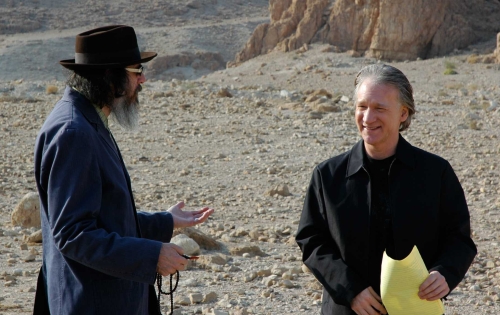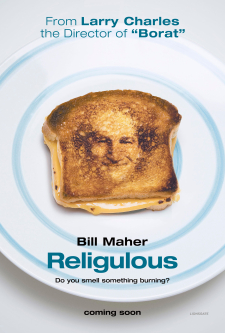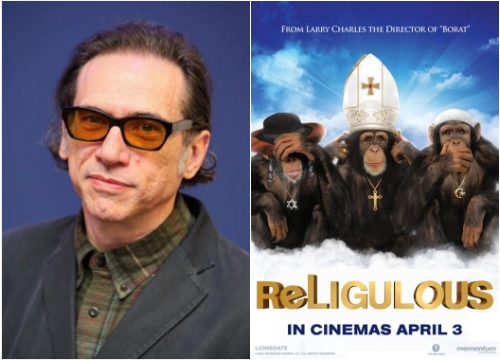
Today the London Film Festival saw a gala screening of Religulous, a documentary featuring US comedian Bill Maher that explores the issue of religious faith.
Directed by Larry Charles (who also directed Borat) it is a riotous and frequently hilarious examination of why human beings believe in stories which cannot be proven, ideas that are often cruel and organisations that are usually corrupt.
The end result is a cross between Michael Moore, Borat and Maher’s own HBO show Real Time in that it is a guerilla documentary that poses smart and often humourous questions at why people believe what they believe.
Using the major faiths of Christianity, Judaism and Islam as the foundation of the film, it also visits numerous religious destinations such as Jerusalem, the Vatican and Salt Lake City, interviewing various people connected to them.
I suspect that the reaction to this film will largely depend on whether you are religious or not.
For those who believe in God it will be a blasphemous blast of outrage whilst for those who don’t it will come as a welcome assertion of doubt.
What’s interesting about the film is that although it points out some of the more ludicrous aspects of religious faith (i.e. the talking snake, a guy trapped inside a whale, death sentences for novelists, magic underwear) it is all undercut by a solid base of intelligence.
Maher has clearly done his homework on the various faiths under the microscope and whilst he doesn’t shy away from joking about them, he also poses some serious questions about the nature of belief and it’s effect on the human race.
As Maher has said about the film, the approach isn’t just to knock religious faith but to examine why and how religion has come to affect human beings:
I’m not trying to mandate that people think anything in particular. I’m just suggesting there’s a different way to think. That’s just free speech.
But when it comes to religion, free speech has been off-limits for many years.
This film is certainly a counterblast to the notion that religion shouldn’t be discussed openly.
 But aside from the subject matter, there are many interesting aspects to the film including three that really stood out for me.
But aside from the subject matter, there are many interesting aspects to the film including three that really stood out for me.
The first involves the theological discussions – many of which descend into unintentional hilarity – such as a conversation with a ‘fake’ Jesus at a religious theme park(!) who Maher informs that the resurrection story is a myth that actually predates Christianity.
The second is the clever editing and use of subtitles which contradict their subjects by voicing concerns or offering points the interviewees forgot to mention.
(One example is the insertion of doubts expressed by the Americans who drafted the US Constitution, such as Benjamin Franklin, Thomas Jefferson and John Adams when someone suggests America is a ‘Christian’ nation.)
The third is the rough and ready camera style which doesn’t shy away from showing the barebones crew hovering around Maher or the numerous B-roll shots which explain how they filmed where they did and the difficultirs involved.
In some ways this approach mirrors Borat and I’m sure some of the same tactics and inventive legal releases were used in order to get people to speak.
I am almost willing to guarentee that a lot of UK critics (like some of their US counterparts) will be snooty about this film, adopting a Pontius Pilate stance, saying that whilst they agree with Maher’s thrust, they disapprove of his smugness and unfair ‘attack’ on religion.
In some ways this misses the point of the film – it is meant to defalte the pomposity of religion and make us laugh at the numerous absurdities it has spawned.
The target audience here is not people of faith, but rather the agnostic and atheistic. In a sense it highlights the nonsense of religion in order to advocate the sense openly criticising those you disagree with.
Whilst many defenders of faith will say they are under attack from ‘smug atheists’ in the ‘liberal media’, surely the events of this decade have shown has dangerous religion can be in the hands of important global figures.
In a world where the current US president has stated that God shapes his foreign policy, religious fanatics encourage acolytes to fly planes into buildings and people are convinced that the Bible is actual fact, this film that shows us doubts worth believing in.
Religulous is scheduled to open at UK cinemas in December
> Religulous at the IMDb
> Find out more about Bill Maher and Larry Charles at Wikipedia
> Reviews for Religulous at Metacritic


